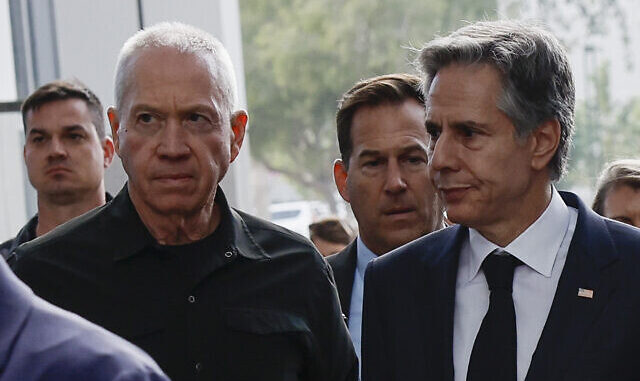T. Belman. There is little chance of the government falling apart.. The polls are so bad for Netanyahu that he has no choice but to embrace his coal;ition partners and they have no choice to embrace him. No one in the coalition wants an early election.
The Biden administration clearly sees moves toward a Palestinian state as the best way forward for Israel and the region, but Jerusalem vehemently disagrees
By ELLEN KNICKMEYER, MATTHEW LEE and MELANIE LIDMAN Today, 2:43 pm

President Joe Biden is greeted by Israeli Prime Minister Benjamin Netanyahu after arriving at Ben Gurion International Airport, on Oct. 18, 2023, in Tel Aviv. (AP Photo/Evan Vucci)
WASHINGTON (AP) — US President Joe Biden’s administration keeps pressing Israel to reengage with Palestinians as partners once fighting in Gaza is over and support their eventual independence. Prime Minister Benjamin Netanyahu keeps saying no.
Even on actions to alleviate the suffering of Palestinian civilians, the two allies are far apart.
That cycle, frustrating to much of the world, seems unlikely to end, despite US Secretary of State Antony Blinken’s fourth urgent diplomatic trip this week to the Middle East since the Israel-Hamas war started. Though the United States, as Israel’s closest ally and largest weapons supplier, has stronger means to apply pressure on Israel, it shows little willingness to use them.
Support of Israel is a bedrock belief of many American voters. Biden’s presidential reelection bid this year puts him up against Republicans vying to outdo one another in support for Israel. For his part, Netanyahu is fighting to stay in office in the face of corruption charges and anger over the failures leading up to October 7.
Some experts warn it’s a formula that may lock the US into deeper military and security engagement in the Middle East as hostilities worsen and Palestinian civilians continue to suffer.
“What may be expedient in terms of short-term domestic politics may not be in the long-term interests of the United States,” said Finucane, who is now a senior adviser to the International Crisis Group research organization. “Particularly if it results in the United States involving itself in further unnecessary wars in the Middle East.”
Since Hamas attacked Israel on October 7, killing some 1,200 people, most of them civilians in their homes or at a music festival, and taking 240 hostages, the US has rushed arms and other aid to Israel, deployed forces to the region to confront escalated attacks by Hamas’s Iran-backed allies, and quashed moves in the United Nations to condemn Israel.
On Thursday, the same day Blinken was wrapping up his diplomatic mission, US warships and aircraft hit targets in Yemen, hoping to quell attacks that the country’s Iran-allied Houthis have launched on commercial shipping in the Red Sea since Israel started its offensive in Hamas-controlled Gaza.
American officials claim modest success for Blinken’s latest diplomatic efforts. He secured limited, conditional support from Arab leaders and Turkey for planning for reconstruction and governance in Gaza after the war ends. But prospects are uncertain because Israel’s far-right government is not on board with several key points.
Israel has been not just uncooperative, but also openly hostile toward some smaller American requests, such as when Blinken pressed Israel to turn over the tax revenue it collects on behalf of the Palestinian Authority, which Israel has refused to do.
But the biggest US disagreement with Israel has been with Netanyahu’s refusal to consider the creation of a Palestinian state. Arab states say a commitment on that point is essential to convincing them to participate in and contribute to postwar planning for Gaza.
Israelis and Americans are far apart on the matter.
The Palestinians have been divided politically and geographically since Hamas, a terror group sworn to Israel’s destruction, overran Gaza in 2007, leaving internationally backed Palestinian Authority President Mahmoud Abbas with self-rule over isolated enclaves in the West Bank. The US wants Abbas’s Palestinian Authority to undergo administrative reforms before setting up a unified government in Gaza and the West Bank, as a precursor to statehood.
“From Israel’s perspective, if you can have a future where they’re integrated into the region, relations are normalized with other countries, where they have the necessary assurances, commitments, guarantees for their security — that’s a very attractive pathway,” Blinken said in Cairo, his last stop. “But it’s also clear that that requires a pathway to a Palestinian state. We’ve heard that from every single country in the region.”
Very little support exists in Israel across the board for a Palestinian state, with many pointing out that previous attempts at reconciliation had largely been met with violence. That appetite was further drastically diminished in the wake of the brutal horrors witnessed in the October 7 onslaught with scenes of massacres, rapes and abuse.
Michael Oren, a former Israeli ambassador to the US, called Blinken’s remarks “tone deaf.” For Israelis, the US push to revive negotiations for Palestinian statehood signals that American leaders haven’t realized how Israeli public opinion has hardened on Palestinian issues over the years, and especially since Hamas’ October 7 attack.
Ultimately, he said, US and Israeli interests don’t always converge. “At the end of the day, there’s a limit, because if [Biden] says stop, we’re not going to stop,” he said.
Israeli leaders know they’ll need to make some concessions to the United States, Oren said. Some they have already made, like letting limited amounts of fuel into the Gaza Strip, something Netanyahu adamantly refused to do in the early days of the war.

Biden has resisted calls from some in his Democratic Party to use US leverage with Israel, chiefly US military support, to try to force the issue.
The administration spoke out publicly against a move by some Democratic senators to tie US military aid to ensuring that Israel takes more concrete steps to reduce civilian casualties in Gaza. The administration says continuing to support Israel’s defense is in the interests of US national security. Since then, it’s twice declared emergencies to authorize new arms sales to Israel without Congress’ OK.
Another attempt to pressure the Biden administration and Israel is expected next week, when Senator Bernie Sanders plans a floor vote on compelling the State Department to tell Congress whether Israel is complying with international humanitarian law.
The United States also has some real incentives to use in encouraging Israel to improve its treatment of Palestinians, including when it comes to steering Israel and Israeli popular opinion toward a long-term political resolution. Israel knows the US is likely to be key in rallying any Arab financial and political support for postwar Gaza, and to Israel’s deep desire to normalize relations with Arab nations, said Michael Koplow, chief policy officer for the Washington-based Israel Policy Forum.
“Blinken has turned into a political analyst who talks about things that may or may not happen,” said Hani al-Masri, director-general of the Palestinian Center for Policy Research and Strategic Studies.
The Biden administration “seems helpless in the face of Netanyahu’s government,” al-Masri said. “What is happening in the case of Israel makes it seem as if it is not serious in all the positive statements it makes about the Palestinian state and Palestinian rights.”
Times of Israel staff contributed to this report.



@Jacob Peretz
I would argue that the left is all but been consumed by the far Left. Gone are the days when such familiar terms as the Blue Dogs was used to describe moderates on the Left and the reason is that the moderates were all consumed or eliminated by the far Left under Obama, though with two arguable holdouts. Indeed, the Left speaks in one voice, and they act as if they are a nation unto themselves, and this is as sobering as it is hard to overcome. Ironically enough, even as Manchin is retiring and Sinema will hopefully be unseated in her reelection bid by a bedrock Rep, we can possibly look to a new voice of potential dissension on the Left, though it is questionable if we should describe him as a moderate yet, in the form of Fetterman. Notably, Manchin walked with the Left on many topics, too many topics actually, it was his obstinacy which blocked the Left from hijacking SCOTUS, just to name a single victory which he handed the nation.
They always say far right.
I never hear any writer say far left.
Anyone who loves his country is a far right to these writers.